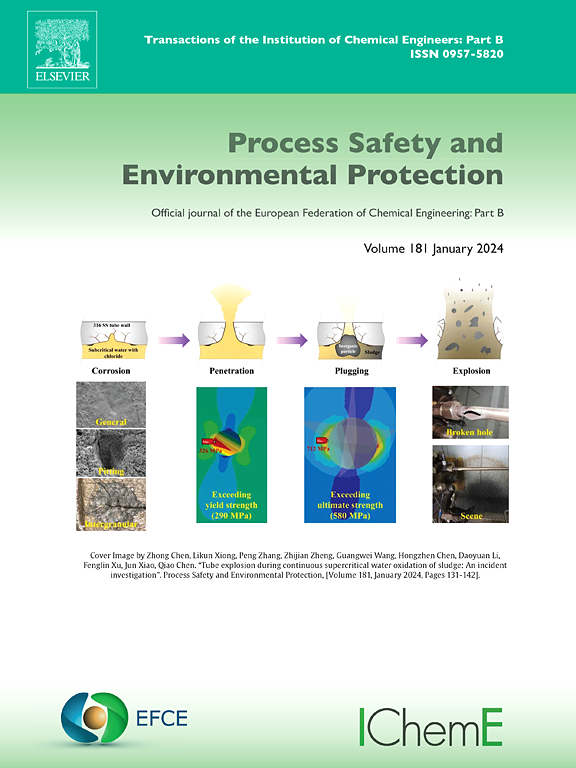研究了介孔碳电极在膜电容去离子中对采矿废水中硫酸盐的电吸附选择性
IF 6.9
2区 环境科学与生态学
Q1 ENGINEERING, CHEMICAL
引用次数: 0
摘要
硫酸盐污染是矿山废水中普遍存在的问题。由于实际采矿废水的复杂成分,我们评估了双活化介孔碳(DPC)电极对模拟溶液和实际采矿废水中硫酸盐的选择性。研究结果表明,膜电容去离子(MCDI)在等摩尔三元溶液中的归一化等效电吸附容量顺序为:SO42-(0.42 mmol/g) >; NO3-(0.31 mmol/g) >; Cl-(0.03 mmol/g),这与DCP和离子性质有关。密度泛函理论(DFT)计算表明,DPC电极对SO42-的选择性也与氧化官能团与SO42-之间具有较高的结合能有关。基于dpc的MCDI可有效去除实际矿山废水中的高浓度硫酸盐和常见重金属。此外,它对SO42-表现出优异的选择性,证明了DPC电极基MCDI处理实际矿山废水的可行性。本文章由计算机程序翻译,如有差异,请以英文原文为准。
Investigating the electrosorption selectivity of mesoporous carbon electrodes for sulfate from mining wastewater in membrane capacitive deionization
Sulfate contamination is a common problem in mining wastewater. We evaluated the selectivity of a dual-activated mesoporous carbon (DPC) electrode for sulfate in simulated solutions and actual mining wastewater due to the complex composition of actual mining wastewater. Our findings showed that the normalized equivalent electrosorption capacity of membrane capacitive deionization (MCDI) in equimolar ternary solution exhibited the following order: SO42- (0.42 mmol/g) > NO3- (0.31 mmol/g) > Cl- (0.03 mmol/g), which was related to the DCP and ionic properties. Density-functional theory (DFT) calculations indicated that the superior selectivity of the DPC electrode for SO42- was also associated with the higher binding energies between the oxidized functional groups and SO42-. DPC-based MCDI effectively removed high concentrations of sulfate and common heavy metals from actual mining wastewater. Moreover, it exhibited excellent selectivity towards SO42-, demonstrating the feasibility of DPC electrode-based MCDI for treatment of real mining wastewater.
求助全文
通过发布文献求助,成功后即可免费获取论文全文。
去求助
来源期刊

Process Safety and Environmental Protection
环境科学-工程:化工
CiteScore
11.40
自引率
15.40%
发文量
929
审稿时长
8.0 months
期刊介绍:
The Process Safety and Environmental Protection (PSEP) journal is a leading international publication that focuses on the publication of high-quality, original research papers in the field of engineering, specifically those related to the safety of industrial processes and environmental protection. The journal encourages submissions that present new developments in safety and environmental aspects, particularly those that show how research findings can be applied in process engineering design and practice.
PSEP is particularly interested in research that brings fresh perspectives to established engineering principles, identifies unsolved problems, or suggests directions for future research. The journal also values contributions that push the boundaries of traditional engineering and welcomes multidisciplinary papers.
PSEP's articles are abstracted and indexed by a range of databases and services, which helps to ensure that the journal's research is accessible and recognized in the academic and professional communities. These databases include ANTE, Chemical Abstracts, Chemical Hazards in Industry, Current Contents, Elsevier Engineering Information database, Pascal Francis, Web of Science, Scopus, Engineering Information Database EnCompass LIT (Elsevier), and INSPEC. This wide coverage facilitates the dissemination of the journal's content to a global audience interested in process safety and environmental engineering.
 求助内容:
求助内容: 应助结果提醒方式:
应助结果提醒方式:


